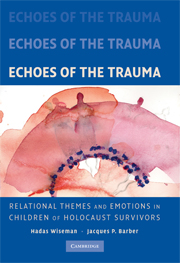Book contents
- Frontmatter
- Contents
- Foreword by Dan Bar-On
- Preface
- Acknowledgments
- 1 Introduction – A Narrative Approach to Bridging the Gap between Clinical Case Studies and Empirical Research on Children of Holocaust Survivors
- 2 Studying Relationship Narratives with the Core Conflictual Relationship Theme Method
- PART ONE RELATIONAL THEMES IN THE NARRATIVES
- PART TWO EMOTIONS IN THE NARRATIVES
- PART THREE HEALING TRAUMA IN THE CHAIN OF THE GENERATIONS
- Appendix
- References
- Index
Appendix
Published online by Cambridge University Press: 29 July 2009
- Frontmatter
- Contents
- Foreword by Dan Bar-On
- Preface
- Acknowledgments
- 1 Introduction – A Narrative Approach to Bridging the Gap between Clinical Case Studies and Empirical Research on Children of Holocaust Survivors
- 2 Studying Relationship Narratives with the Core Conflictual Relationship Theme Method
- PART ONE RELATIONAL THEMES IN THE NARRATIVES
- PART TWO EMOTIONS IN THE NARRATIVES
- PART THREE HEALING TRAUMA IN THE CHAIN OF THE GENERATIONS
- Appendix
- References
- Index
Summary
THE SECOND-GENERATION STUDY
The interviewees in this book are those who comprised the group of Holocaust Survivor Offspring (HSO) in our BSF-funded study on Central Relationship Patterns (Wiseman & Barber, 2000; Wiseman, Barber, Raz, Yam, Foltz, & Livne-Snir, 2002). Here we provide information on the procedure, namely, the recruitment of the participants, the Relationship Anecdotes Paradigm (RAP) interviews, the Core Conflictual Relationship Theme (CCRT) ratings, and the narrative qualitative analysis. Details on the demographic background of the participants are presented in Table 1.
Recruitment of the Participants to Our Second-Generation Study
The participants were randomly sampled from lists provided by the Israel Population Registry that included Jewish men and women born in Israel between 1946 and 1966, whose parents migrated to Israel from Eastern European countries after 1945 (i.e., their parents were residing in Eastern European countries during the war). Sagi-Schwartz with their large research project on three generations (Sagi-Schwartz, van IJzendoorn, Grossmann, Joels, Grossmann, Scharf, Koren-Karie, & Alkalay, 2003), which was conducted in Israel around the same period, were the first to get permission for this procedure of receiving such lists for the purposes of conducting controlled studies on families of Holocaust survivors. We were fortunate that this procedure paved the way for our study. The sampling and recruitment procedure involved two stages. First, we randomly sampled from these lists of potential HSO. Second, we approached these potential participants through a phone interview to request relevant information regarding the specific Holocaust background of their parents.
- Type
- Chapter
- Information
- Echoes of the TraumaRelational Themes and Emotions in Children of Holocaust Survivors, pp. 249 - 256Publisher: Cambridge University PressPrint publication year: 2008



